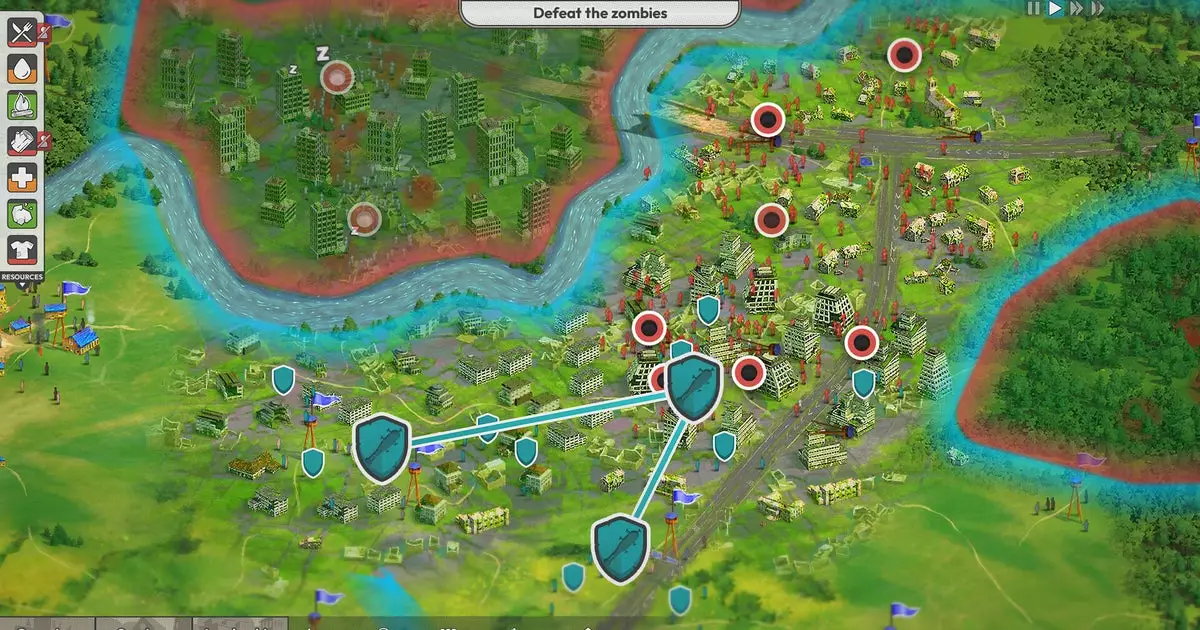Ndemic Creations, renowned for its controversial yet impactful game Plague Inc, has embarked on a daring journey into the realm of post-apocalyptic strategy with its upcoming release, After Inc: Revival. Initially launched in 2012, Plague Inc became a global phenomenon, particularly during the COVID-19 pandemic, as players found a twisted solace in simulating global contagion. Now, the developers aim to flip the script by inviting players not to spread doom but to engage in the rebuilding process after societal collapse.
After Inc: Revival is set in the hauntingly picturesque landscape of a post-apocalyptic United Kingdom, where nature has reclaimed the remnants of human civilization. This backdrop, filled with charming blue rooftops, derelict city blocks overtaken by greenery, and the soft rustle of golden cornfields, paints a stark contrast to the decay that precedes it. But the beauty of this environment is not without peril; zombies still roam the countryside, threatening the delicate balance of the new society players will strive to create.
This juxtaposition of tranquil beauty amid chaos may serve to engage players’ emotions, compelling them to confront themes of renewal in the face of ruin. Unlike Plague Inc, where the objective was to exterminate humanity through a plague, After Inc challenges players to nurture a community from the very ashes of their former society. The contrasting experiences highlight a significant shift in the narrative and emotional stakes of the game.
At its core, After Inc: Revival is a blend of city-building and 4X (explore, expand, exploit, and exterminate) mechanics. Players will exploit the remnants of the past to gather resources, expand their settlements, and provide services that maintain societal happiness. The game encourages critical thought through necessary moral dilemmas, asking players if they can afford children or if using dogs as a source of food is justifiable in the face of survival.
The addition of political elements—where players can choose between democracy or authoritarianism—introduces a deeper layer of strategy reminiscent of games like Frostpunk. This invites players to reflect on the nature of governance in dire situations and the ethical implications behind their decisions. As they build their settlements and address crises, the narrative shaped by their choices unveils a complex web of social dynamics, ultimately reflecting on humanity’s resilience and adaptability.
One of the key features touted by Ndemic Creations is the introduction of ten unique leaders, each with distinct abilities that can significantly impact gameplay. This diversity not only enhances replayability but allows players to explore various strategies in settlement management. The game promises a sophisticated portrayal of zombie behavior based on real-world research, which could add an intriguing layer of realism to the game’s survival aspects.
Moreover, the early access phase set for 2025 is expected to introduce new content, including more settlement leaders, expanded campaigns, and complex character traits. Each update aims to deepen the player’s understanding of the Necroa virus, the catalyst for the undead upheaval. This progressive enhancement of game content demonstrates Ndemic’s commitment to creating an engaging and evolving user experience.
While After Inc: Revival adopts a fanciful portrayal of a zombie apocalypse, the underlying themes resonate with the collective trauma experienced during the coronavirus pandemic. The developers have acknowledged the parallels, albeit humorously distancing the gameplay from real-world events. However, the game raises significant questions about recovery and the notion of a “return to normal.”
As players engage in the rebuilding process post-catastrophe, are they merely playing out a fantasy, or are they subconsciously grappling with the ramifications of their real-world experiences? The game’s aesthetic and core messages could prompt discussions about how society reacts to trauma and the resilience required to heal from it.
After Inc: Revival represents a bold departure for Ndemic Creations, inviting players not just to witness destruction but to engage actively in the process of reconstruction. The game promises layered gameplay, moral complexity, and actionable decision-making that reflect the human experience in trying times. As we grapple with lingering pandemics and societal breakdowns, this game may provide both an escape and a mirror to our current vulnerabilities. Ultimately, the question remains—what kind of society will players build, and how will it reflect upon our shared journey through the ongoing struggles of the modern world?


Leave a Reply